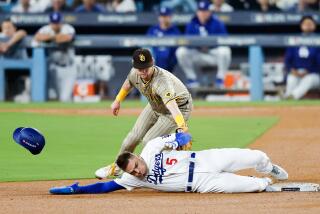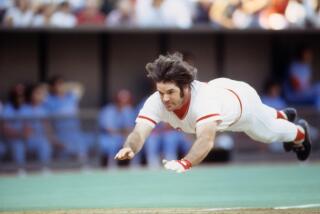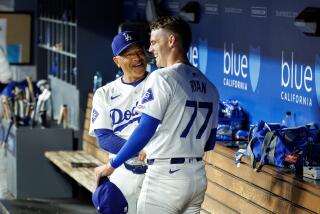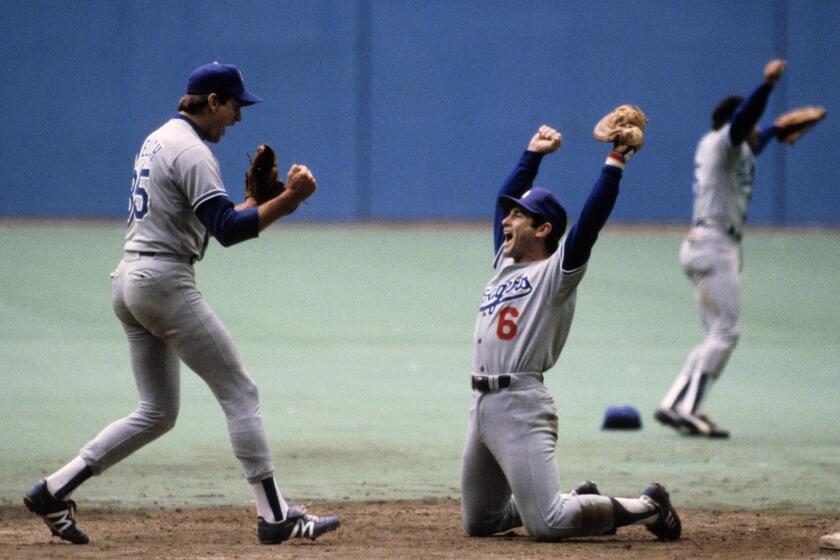On Opening Day, a Call for the Return of the Stolen Base
When the gods come to Earth on the baseball diamond this season, I’m rooting for the thieves and tricksters.
We’d know they were stirring things up if, in today’s opening-day Dodger game, there were four or five stolen bases and no home runs. That might be a sign that this year we won’t have to sit through another mind-numbing chase to break a home-run record that no longer seems to matter. It might even signal a shift in the athletic music of our culture as the crushing logic of the home run surrenders to the chaos and romance of the stolen base.
For the record:
12:00 a.m. April 3, 2002 FOR THE RECORD
Los Angeles Times Wednesday April 3, 2002 Home Edition Main News Part A Page 2 A2 Desk 1 inches; 25 words Type of Material: Correction
Base-stealer summary--A Today’s News summary on Tuesday about Southern California Living’s baseball story incorrectly stated the writer’s gender. Kelly Candaele is a man.
In my mind, the real gods of baseball are not Barry Bonds and Mark McGwire, the long-ball hitters who occasionally stroll around the bases, never having to strain to beat out a base hit or hurl their bodies blindly toward second merely to place themselves 90 feet closer to home.
The more interesting deities are the great base-stealers and speedsters such as ex-Dodger Maury Wills, ex-Cardinal Lou Brock or Rickey Henderson, who at 43 just signed with the Red Sox. The ancient Greeks called the fleet-footed Hermes the “god of the crossroads.” He was an evasive trickster who shook up the static cosmos of the Olympian world, and, like any good base-stealer, he was full of mischief and mayhem, a god of accidents and chance encounters. When he entered the picture, things got interesting.
Anyone who has ever seen Wills, Brock or Henderson play knows the tension they created when they reached first base.
Fans knew they would be “going” at the first opportunity, and the game suddenly became focused on the elaborate flirtation and seduction taking place between runner, pitcher and catcher, set in motion by the feints, long leads and the ultimate madness of the rush toward second.
Watching a great base-stealer is like viewing an exquisite drama. Each attempted steal has the same basic structure, but an infinite number of variations depending upon the opposition, the game situation and runner’s psychological preparation.
Wills claimed his record-breaking feats were his way of communicating with God. When he reached first base, he felt there was a higher power urging him to run.
He also recognized the less sublime motivations that drove him, the illicit delight he took in torturing countless pitchers and catchers who couldn’t stop him. Often he would steal a base, he explained, not because the game situation demanded it, but just so his opponents would “hate me more.” Like St. Augustine, describing his theft of fruit in his “Confessions,” what made his desire sinful was thievery for its own sake, for the simple pleasure of doing what was wrong.
Ahome run provides a less complex thrill, a sudden cathartic release of tension that is momentarily satisfying. Sadaharu Oh, the career home-run king of the Japanese League, describes it as a kind of Zen utopia, the long arc of a ball hit squarely and for distance allowing him a temporary release, free of all the “complications ... and obstructions” of real life.
But the home run is no longer adequate to American society as a unifying myth. We can’t quite sustain its illusion of definitiveness and strength. Today we live with caprice and chaos, dark primal social forces we cannot control and an economic landscape that just yesterday promised a never-ending upward trajectory, only to disappoint.
A home run launches the ball on a journey into the ephemeral light. It creates the fantasy that it may never come down, defying nature’s basic laws, disappearing somewhere in the distance. The stolen base, though, is of the Earth, grounded in the world’s gravity and weight. When a base-stealer is caught, gunned down, nailed--there is a solitary walk back to the dugout, a melancholy acknowledgment of life’s limits.
The base-stealer, baseball’s small entrepreneur, is a more appropriate hero/underdog for a time when the power machinations of corporate takeovers have become a spectator sport. Base-stealing is like our lives--messy, full of fits and starts and entirely unpredictable.
Yet fewer and fewer players are adept at what is becoming an ancient art, and fewer managers regard stealing bases as an effective offensive tool.
Henderson’s 1982 record of 130 stolen bases still stands. At the time, baseball observers predicted that someone would soon steal 200, upsetting the finely ordered universe of the game through absolute success. But only one other player has stolen more than 100 bases since then, and last year, Seattle’s Ichiro Suzuki led the major leagues with only 56.
Home runs are now part of baseball’s economic bottom line and ballparks are built for hitters, not runners.
Without a home run, fans leave the stadium with the feeling that somehow, they’ve been robbed. But there is a price to pay.
Ralph Waldo Emerson, who thought a great deal about American culture, pointed out that there is no way to avoid the tax that the universe imposes upon those who abandon a sense of limits. In his essay “Compensation,” he wrote that “equity adjusts itself in all parts of life,” and that the “deep remedial force” of nature must eventually bring balance back to an unstable world. So I wait for the redemptive grace of a great base-stealer who will release the game again from its over-dependence on the ephemeral pleasures of the long ball.
Writer George Plimpton rhapsodizes that “a home run stamps itself upon the memory like nothing else in sport.” But that’s not the way my mom, Helen Callaghan, saw it. She played four years in the All American Girls Professional Baseball League, immortalized in Penny Marshall’s film “A League of Their Own.” She stole 112 bases in 1944, the same year she led the league in hitting.
Looking back in later years, she spoke only briefly of her home runs. They were merely a nostalgic blur. But she remembered the stolen bases with an animated pride, remarking that at times she got such great jumps off of pitchers that she didn’t even have to slide. She took a special delight in explaining that stealing third was easier than stealing second because no one expected it. She attempted to transmit the intricacies of the art to my younger brother Casey, who played for the Montreal Expos and Houston Astros, but with no success. She stole more bases in one year than he did in his entire career.
I saw her play in a reunion game one year, when she was well into her 60s. She reached first and, sure enough, started tormenting the pitcher with an outrageous lead.
My mom, shy and soft-spoken off the field, had the sly and evasive grace of a trickster god when provided the narrative terrain of a baseball game.
Like all great base-stealers, she was not satisfied to remain on first, so far from “home.” In that first crossover step and drive toward second, she asserted her freedom, a kind of personal sacrament and destabilizing jolt against the status quo. By running, she set the world in motion.
I imagine the quick turn of my mom’s shoulders, the frantic thrust of her arms and the hunger in her pumping legs. I feel today what she must have felt then. I’ll take the mad dash of a great base-stealer over a lazy trot around the diamond any day.
Kelly Candaele is a frequent contributor to The Times.
More to Read
Go beyond the scoreboard
Get the latest on L.A.'s teams in the daily Sports Report newsletter.
You may occasionally receive promotional content from the Los Angeles Times.










